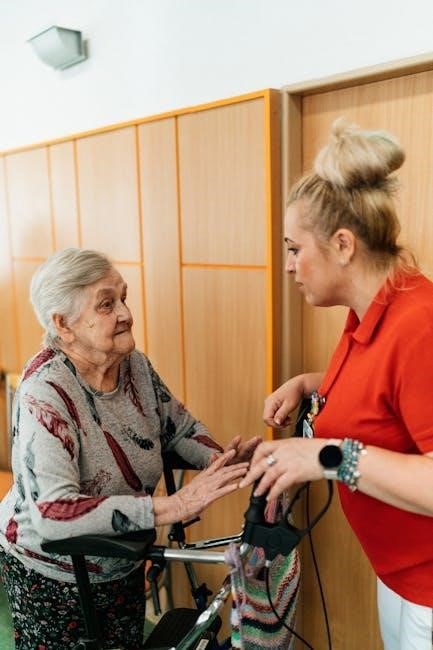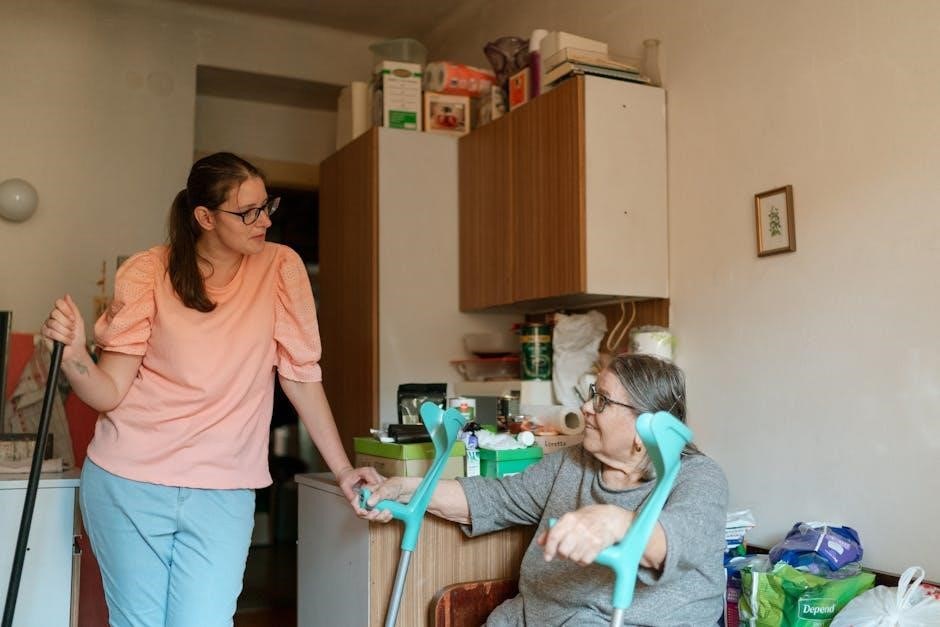nursing assisting a foundation in caregiving 6th edition pdf free
Nursing assisting serves as a vital support role in healthcare‚ providing essential care and compassion to patients․ This foundational textbook guides learners in developing critical skills for effective caregiving․
1․1 The Role of Nursing Assistants in Modern Healthcare
Nursing assistants play a crucial role in modern healthcare‚ providing direct patient care and supporting healthcare teams․ They ensure patients’ basic needs are met‚ assist with daily activities‚ and monitor health status․ Their role is essential for maintaining patient safety‚ comfort‚ and dignity across various healthcare settings‚ from hospitals to home care‚ making them indispensable in delivering high-quality‚ patient-centered care․
1․2 Overview of the 6th Edition of the Textbook
The 6th edition of Nursing Assisting: A Foundation in Caregiving offers a comprehensive guide to nursing assisting‚ focusing on patient-centered care‚ effective communication‚ and clinical skills․ Updated with current practices‚ it includes enhanced content on infection control‚ cultural competence‚ and technology in healthcare․ New case studies and interactive learning tools make this edition a valuable resource for both students and practicing nursing assistants․
Key Concepts in Nursing Assisting
Essential concepts include effective communication‚ patient safety‚ and ethical practices․ These principles guide nursing assistants in providing compassionate‚ person-centered care while adhering to professional standards and promoting patient well-being․
2․1 Communication Skills for Effective Caregiving
Effective communication is crucial in nursing assisting‚ ensuring clear understanding between caregivers and patients․ Active listening‚ empathy‚ and clarity build trust‚ while adapting communication strategies to meet individual needs fosters personalized care and mutual respect․
2․2 Understanding Patient Needs and Preferences
Understanding patient needs and preferences is vital for providing personalized care․ Assessment tools and open-ended communication help identify physical‚ emotional‚ and cultural needs․ Recognizing these elements ensures care plans are tailored to individual lifestyles‚ values‚ and expectations‚ promoting patient satisfaction and well-being․ Involving patients in decision-making fosters a collaborative approach to caregiving․
Clinical Skills and Procedures
Clinical skills and procedures are essential for providing high-quality patient care‚ emphasizing infection control‚ safety‚ and effective communication to ensure optimal outcomes and patient well-being․
3․1 Essential Patient Care Procedures
Essential patient care procedures include vital sign monitoring‚ bathing‚ and mobility assistance․ These tasks ensure patient comfort and safety‚ supporting overall well-being and recovery․ Proper technique and attention to individual needs are crucial for effective care․ Nursing assistants play a key role in performing these procedures accurately and compassionately‚ adhering to infection control and safety protocols to prevent complications and promote healing․ Assessment tools help track patient progress and guide personalized interventions․
3․2 Infection Control and Safety Protocols
Infection control and safety protocols are critical in healthcare settings to prevent the spread of infections․ Nursing assistants must adhere to proper hand hygiene‚ use personal protective equipment (PPE)‚ and safely handle biohazardous materials․ Maintaining a clean environment and following isolation precautions are essential․ These practices ensure patient safety‚ reduce risks‚ and promote high-quality care․ Adherence to these guidelines is vital for protecting both patients and caregivers․

Legal and Ethical Considerations
Nursing assistants must adhere to legal and ethical standards‚ respecting patient rights and confidentiality․ Ethical dilemmas often arise in caregiving‚ requiring sound judgment and adherence to legal requirements․
4․1 Patient Rights and Confidentiality
Patient rights and confidentiality are cornerstone principles in healthcare․ Nursing assistants must respect patients’ autonomy‚ dignity‚ and privacy‚ adhering to laws like HIPAA․ Ensuring confidentiality builds trust‚ while respecting patients’ rights promotes ethical care․ Understanding these principles is essential for providing compassionate and legally sound support in all caregiving settings․

4․2 Ethical Dilemmas in Nursing Care
Ethical dilemmas in nursing care often arise from conflicts between patient autonomy‚ safety‚ and medical directives․ Common challenges include end-of-life decisions‚ informed consent‚ and resource allocation․ Nursing assistants must navigate these situations with empathy‚ respecting patient wishes while adhering to ethical guidelines․ Open communication and collaboration with healthcare teams are key to resolving such dilemmas compassionately and professionally․

Safety and Emergency Preparedness
Identifying safety hazards and implementing protocols are crucial․ Nursing assistants must be prepared to respond to emergencies‚ ensuring patient and staff safety through prompt and effective actions․
5․1 Identifying and Reporting Safety Hazards
Nursing assistants play a critical role in identifying potential safety hazards in patient care environments․ These include tripping hazards‚ improper equipment use‚ and environmental risks․ Timely reporting of these hazards ensures prompt resolution‚ preventing accidents and improving patient outcomes․ Documentation of identified risks and corrective actions is essential for maintaining a safe and reliable care setting․
5․2 Responding to Medical Emergencies
Responding to medical emergencies requires quick action and adherence to established protocols․ Nursing assistants must remain calm‚ assess the situation‚ and provide immediate care within their scope of practice․ Effective communication with the healthcare team is crucial to ensure coordinated efforts․ Documentation of the emergency and actions taken is essential for continuity of care and legal accountability․

Cultural Competence in Caregiving
Cultural competence in caregiving involves understanding and respecting diverse patient backgrounds‚ beliefs‚ and practices․ It enhances care quality‚ patient satisfaction‚ and trust‚ fostering person-centered approaches in healthcare settings․
6․1 Understanding Diversity in Patient Care
Understanding diversity in patient care involves recognizing cultural differences‚ beliefs‚ and values that shape patient needs․ This awareness fosters respectful interactions and tailored care approaches‚ ensuring inclusivity and sensitivity․ By addressing individual preferences‚ caregivers can enhance patient satisfaction and outcomes․ Embracing diversity also promotes a supportive environment‚ encouraging open communication and trust between caregivers and patients from all backgrounds․
6․2 Providing Person-Centered Care
Person-centered care focuses on tailoring care to meet individual patient needs‚ preferences‚ and values․ This approach emphasizes patient empowerment‚ dignity‚ and involvement in care decisions․ By prioritizing personalization‚ caregivers foster a supportive environment that respects each patient’s unique background and promotes overall well-being․ This method enhances patient satisfaction and outcomes‚ ensuring compassionate and meaningful care delivery․

Mental and Emotional Support
Mental and emotional support is crucial in caregiving‚ addressing patients’ psychological needs and fostering resilience․ It also helps caregivers manage stress‚ ensuring compassionate care․
7․1 Supporting Patients with Mental Health Needs
Nursing assistants play a vital role in supporting patients with mental health needs by fostering a supportive environment․ Effective communication and active listening are essential to understand their concerns․ Using assessment tools helps identify changes in cognition and functioning‚ enabling tailored care․ Encouraging patients to express feelings and adapting care plans to their preferences promotes emotional well-being and resilience‚ ensuring person-centered care․
7․2 Managing Stress as a Caregiver
Managing stress is crucial for caregivers to maintain their well-being and provide effective care․ Recognizing signs of stress‚ such as burnout or emotional fatigue‚ is the first step․ Engaging in self-care practices‚ like mindfulness or exercise‚ helps alleviate tension․ Building a support network and seeking help when needed are essential․ Open communication with colleagues and utilizing available resources can further mitigate stress‚ ensuring caregivers thrive in their roles․

Technology and Nursing Assisting
Technology enhances patient care efficiency and accuracy․ Digital tools‚ such as EHRs‚ streamline documentation and improve communication․ Telehealth platforms expand access to care‚ benefiting both patients and providers․
8․1 Using Digital Tools for Patient Care
Digital tools like electronic health records (EHRs) and telehealth platforms enhance patient care by improving documentation accuracy and accessibility․ These technologies enable caregivers to monitor patient progress efficiently‚ streamline communication‚ and provide personalized care․ Assessment tools‚ such as OASIS‚ help track patient outcomes‚ ensuring high-quality care․ Integrating these tools supports informed decision-making and better collaboration among healthcare providers‚ ultimately improving patient well-being and care coordination․
8․2 Electronic Health Records (EHRs) in Nursing
Electronic Health Records (EHRs) are essential in modern healthcare‚ improving documentation accuracy and streamlining patient data access․ They enable real-time sharing of patient information among healthcare providers‚ enhancing collaboration and care coordination․ EHRs also support personalized care plans and ensure patient safety through medication alerts and allergy notifications․ Nursing assistants benefit from EHRs by efficiently tracking patient progress and communicating effectively with the care team․

Career Development for Nursing Assistants
Nursing assistants can advance their careers through specialized certifications‚ continuing education‚ and pursuing higher nursing degrees․ These opportunities enhance skills‚ broaden job prospects‚ and increase earning potential․
9․1 Advancement Opportunities in Nursing
Nursing assistants can advance their careers by specializing in areas like geriatric or pediatric care․ Pursuing higher education‚ such as becoming a licensed practical nurse (LPN) or registered nurse (RN)‚ offers greater responsibilities and opportunities․ Additionally‚ certifications in critical care or rehabilitation can enhance expertise and open doors to leadership roles‚ providing a pathway for professional growth and increased job satisfaction in the nursing field․
9․2 Continuing Education and Certification
Continuing education is crucial for nursing assistants to stay updated on best practices and advancements in healthcare․ Certifications‚ such as CNA (Certified Nursing Assistant) or CMA (Certified Medical Assistant)‚ enhance credibility and career prospects․ Many states require ongoing education to maintain certification‚ ensuring professionals remain skilled and knowledgeable in providing high-quality patient care․ This commitment to lifelong learning fosters professionalism and adaptability in the ever-evolving healthcare landscape․

Community Resources and Support
Community resources and support networks provide essential tools for caregivers‚ enhancing their ability to deliver compassionate care․
10․1 Accessing Support for Caregivers
Accessing support for caregivers is crucial for providing effective care․ Resources like assessment tools and guides help caregivers navigate challenges․ Collaboration between formal and informal caregivers ensures comprehensive support․ Seeking help through community networks and professional guidance is essential for maintaining quality care and reducing caregiver stress․
10․2 Building a Network of Caregiving Professionals
Building a network of caregiving professionals enhances collaboration and resource sharing․ Connecting with formal and informal caregivers fosters a supportive environment․ Utilizing tools like the OASIS dataset and community guides helps strengthen these networks․ Networking opportunities‚ such as support groups and professional forums‚ empower caregivers to share experiences and access resources‚ ultimately improving care quality and patient outcomes․
